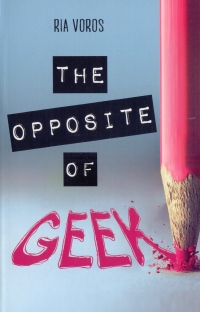| ________________
CM . . .
. Volume XX Number 12. . . .November 22, 2013
excerpt:
Obligated to get a tutor when her high school chemistry grade hits rock-bottom, Gretchen Meyers is not pleased. As a young writer, she’d much prefer spending her time in a more creative endeavor, ideally, composing poetry to add to her vast collection, but, instead, she is forced to remain cooped up in the library, learning enough about her least favourite subject in order to pass the course. Already labeled as one of the most unpopular kids in school, Gretchen only realizes how much lower her status can sink when she meets her new tutor, James, a self-proclaimed chemistry nerd and arch enemy of the school’s swim team. However, the more time Gretchen spends with him, the more she realizes James isn’t such a bad guy. In fact, in addition to helping her raise her pitiful grades, James also brings excitement to Gretchen’s life by introducing her to his dreamy cousin, Dean. The three teens become fast friends, and it’s not long before Gretchen begins devoting all of her free time to hanging out with James and Dean, suddenly finding herself a central part of all their wacky adventures. But despite all the fun she’s having, Gretchen can’t help but notice the drama pooling around her, including her growing feelings for Dean, the inability to click with the cliques at school, as well as the rising tension between James and the jocks. Suddenly, everything isn’t so simple anymore, and Gretchen finds herself in the midst of a situation she never thought possible, feeling completely alone, and unsure of how to deal with the pain that has suddenly overwhelmed her daily life. Struggling to navigate through a series of difficult emotions and relationships, Gretchen must overcome the pain that threatens to destroy her and, in addition to surviving chemistry, figure out what it means to be a friend, to be brave, and to fight for what’s important. Ria Voros’, The Opposite of Geek provides a realistic narrative about the hardships of navigating through different friendships and cliques during the high school years. To reflect Gretchen’s passion for language, the style of the novel, itself, is quite poetic – a unique feature that may not only attract, but inspire, many young writers. In this novel, Voros weaves a plot focused on the various reactions of those who are picked on in school, highlighting the sometimes serious repercussions of bullying. As Gretchen is the protagonist, her struggles to fit in with the girls around her are addressed quite openly throughout the novel, adding depth to her character and encouraging readers to connect with her plight. Teased, picked-on, and abandoned, Gretchen ends up finding her own strength within herself, and inevitably drawing on this newfound courage in order to survive, leaving readers with a strong moral that could be applicable within their own lives. Although it would have been satisfying to include an ending that allowed Gretchen to be embraced by a solid group of friends as a reward for her survival, the fact that Voros strays from this predictability mirrors the reality of life as we know it. Though James’ bullying is also a critical theme in this novel, compared to Gretchen, the reader receives a lot less detail regarding his experiences, thereby making it slightly more difficult to understand and sympathize with his character. As a student struggling to find a sense of belonging during her high school years, Gretchen’s story is one that is familiar to many teens. However, it lacks the sense of closure seen in most problem novels as there is no sense of a clean ending to Voros’ work, and hence, no answers for many of Gretchen’s concerns. Nearing the end of the novel, it becomes clear that none of the bullies feel any sense of remorse for the way they treated victims such as James. While this incident, again, may be closer to a real-life portrayal in many cases, I feel there was room for Voros to create some sense of sympathy among these characters, stressing the message that bullying is never acceptable. Recommended. Sarah Clark is a liaison librarian at the University of Manitoba in Winnipeg, MB.
To comment
on this title or this review, send mail to cm@umanitoba.ca.
Copyright © the Manitoba Library Association. Reproduction for personal
use is permitted only if this copyright notice is maintained. Any
other reproduction is prohibited without permission.
NEXT REVIEW |
TABLE OF CONTENTS FOR THIS ISSUE
- November 22, 2013.
AUTHORS |
TITLES |
MEDIA REVIEWS |
PROFILES |
BACK ISSUES |
SEARCH |
CMARCHIVE |
HOME |
